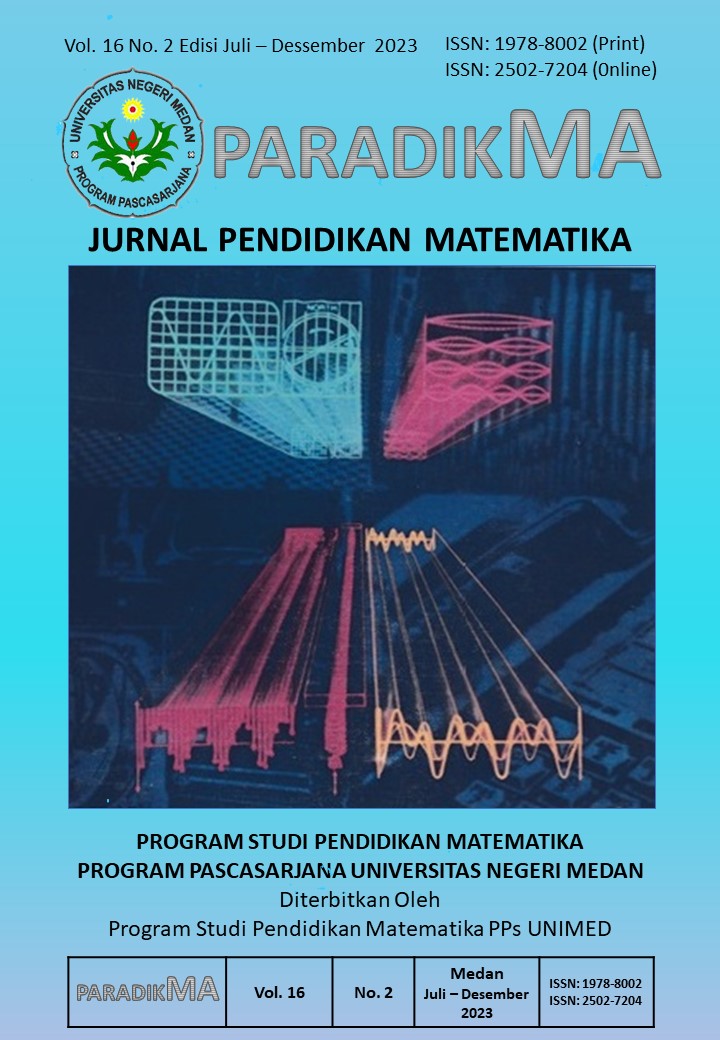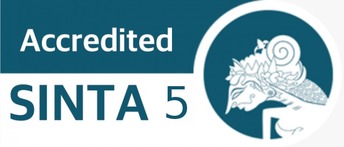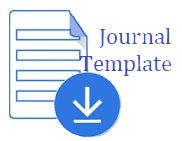DEVELOPMENT OF MATHEMATICAL LITERACY PROBLEMS IN THE MINIMUM COMPETENCY ASSESSMENT (AKM) FOR CLASS VIII STUDENTS OF JUNIOR HIGH SCHOOL
DOI:
https://doi.org/10.24114/paradikma.v16i2.50155Abstract
The replacement of the National Examination into the 2021 National Assessment which consists of 3 elements, namely AKM, character survey, and learning environment survey. The Minimum Competency Assessment (AKM) focuses on students' ability to master reading literacy and numeracy literacy so that students are required to have good mathematical literacy skills. This research is a Research and Development study which aims to (1) produce mathematical literacy questions on the minimum competency assessment (produce valid and reliable mathematical literacy questions in the minimum competency assessment (AKM) for class VIII SMP students in the form of an essay test.; (2) Knowing students' responses to the mathematical literacy problems being developed. This research was carried out in class VIII H of SMP N 9 Purwokerto, by carrying out one product trial phase for 80 minutes. The AKM standards used in developing mathematical literacy questions contain three components, namely content, context and cognitive processes, with material content limitations including algebra, plane figures, arithmetic rows and series, data presentation and comparison. The instruments in this research used mathematical literacy question sheets, teacher response questionnaires, and validator sheets. The model used in this development is the Thiagaradjan, and Semmel & Semmel 4-D model which consists of four stages; (1) Define; (2) Design; (3) Develop; and (4) Disseminate. However, this research has only reached the 3D or Develop stage. The limit of question content is middle school material for grades 7 and 8. The results of the research show that the level of validity of mathematical literacy questions in the Minimum Competency Assessment (AKM) has the criteria of "valid" because it meets the requirements of ≥75 with a percentage per item reaching more than of 75% and the overall percentage obtained a score of 81%. The reliability calculation results for question package A are 0.67 and question package B is 0.65, so these two questions can be said to be "reliable". Apart from that, students' responses to mathematical literacy questions showed "good" criteria with a percentage of 82%, this means that mathematical literacy questions made students interested in the questions being developed.Keywords: Minimum Competency, Assessment (AKM), Mathematical Literacy, 4D Model, SMP N 9 PurwokertoReferences
Alhamid, T., & Anufia, B. (2019). Resume : Data Collection Instrument. State Islamic College (STAIN) Sorong, 6.
Anwar, NT (2018). The Role of Mathematical Literacy Ability in 21st Century Mathematics Learning. Proceedings of the National Mathematics Seminar, 1, 364“370.
Arikunto, S. (2010). Research Procedure: A Practical Approach. Rineka Cipta.
Asmara, A., & Sari, DJ (2021). Development of Social Arithmetic Problems Based on Mathematical Literacy for Middle School Students. Journal of Scholars : Journal of Mathematics Education, 5(3), 2950“2961. https://doi.org/10.31004/cendekia.v5i3.982
Fathani, AH (2016). Rahmah Johar. "PISA Question Domains for Mathematical Literacy". Journal of EduSains, 4(2), 136“150.
Fauziah, A., Sobari, EFD, & Robandi, B. (2021). Analysis of Understanding of Junior High School Teachers (SMP) Regarding the Minimum Competency Assessment (AKM). Educative : Journal of Educational Sciences, 3(4), 1550“1558. https://edukatif.org/index.php/edukatif/article/view/608
Jurnaidi, J., & Zulkardi, Z. (2014). Development of Pisa Model Questions on Change and Relationship Content to Know the Mathematical Reasoning Ability of Junior High School Students. Journal of Mathematics Education, 8(1), 38“54. https://doi.org/10.22342/jpm.8.1.1860.25-42
Krissandi, ADS, Sudigdo, A., & Nugraha, AS (2021). Innovative Learning Models and AKM-Based Questions for SMA Level. PT Kanisius.
Mita, R. (2015). Interview A Communication Interaction in Qualitative Research. In Journal of Cultural Studies (Vol. 11, pp. 71“79). https://media.neliti.com/media/publications/100164-ID-interview-a-interaksi-komunikasi-da.pdf
Nature, AFP (2016). Development of Societal Context Mathematical Literacy Questions for class VII SMP/MTs.
OCED. (n.d.). Survey International Program for International Student Assessment (PISA). Retrieved March 5, 2023, from https://www.oecd.org/pisa/
OCED. (2013). PISA 2012 Assessment and Analytical Framework : Mathematics, Reading, Science, Problem Solving, and Financial Literacy. OCED Publishing.
Ojose, B. (2011). Mathematics Literacy : Are We Able to Put the Mathematics We Learn Into Everyday Use? Journal of Mathematics Education, 4(1), 89“100.
Rohim, DC, Rahmawati, S., & Ganestri, ID (2021). The Concept of Minimum Competency Assessment to Improve the Numerical Literacy of Elementary School Students. Journal of VARIDIKA, 33(1), 54“62. https://doi.org/10.23917/varidika.v33i1.14993
Sani, RA (2021). AKM Oriented Learning (Minimum Competency Assessment) (1st ed.). PT Bumi Aksara. https://books.google.co.id/books?hl=en&lr=&id=vo8lEAAAQBAJ&oi=fnd&pg=PA1&dq=book+Assessment+Competencies+Minimum&ots=pleWo_M6nz&sig=oXpeWpP3UmT_IWj66g8K46YcZH4&redir_esc=y#v=onepage&q=assessment book Minimum Competency&f=false
Sari, RHN (2015). Mathematical Literacy: What, Why and How. UNY National Seminar and Mathematics Education, 713“720.
Satriani, NL (2021). Completely Peeled Off Numerical AKM Questions: Ready to Face the 2022 National Assessment (1st ed.). PT. Nasya Expanding Management. https://books.google.co.id/books?hl=en&lr=&id=lSxTEAAAQBAJ&oi=fnd&pg=PR1&dq=kupas+tuntas+assessment+kompetensi+minimum&ots=su9Fcivnrp&sig=D3E2khd78_Exom8Wc9qM7LVvq-o&redir_esc=y#v=onepage&q=peel complete minimum competency assessment&f=false
Saukiyah, S. (2017). Development of Madurese Ethnic Culture-Based Mathematical Literacy Questions for Middle School/MTs Students. University of Jember Digital Repository.
Sugiyono. (2019). Research and Development Methods: Research and Development / R&D (4th ed.). Alphabet.
Tampubolon, J., Atiqah, N., & Panjaitan, UI (2019). The Importance of Basic Mathematical Concepts in Everyday Life in Society. Medan State University Mathematics Study Program.
Thiagarajan. (1976). Instructional development for training teachers of exceptional children: A sourcebook. Journal of School Psychology, 14(1). https://doi.org/10.1016/0022-4405(76)90066-2
Trisnaningtyas, NO, & Khotimah, RP (2022). Analysis of Mathematical Literacy Ability in Solving AKM Questions in terms of Learning Style. 11(4), 2714“2724.







